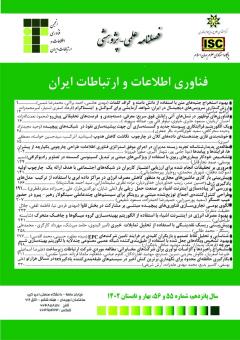بررسی اثر پیاده سازی اینترنت اشیاء بر صنعت حمل ریلی بار با رویکرد آینده پژوهی
محورهای موضوعی : فناوری اطلاعات و ارتباطات
نورالدین طراز منفرد
1
![]() ,
علی شایان
2
,
علی رجب زاده قطری
3
,
علی شایان
2
,
علی رجب زاده قطری
3
1 - دانشگاه تربیت مدرس
2 - دانشگاه تربیت مدرس
3 - Tarbiat Modarres University
کلید واژه: سیستم هوشمند حمل و نقل, اینترنت اشیاء ریلي, قطار هوشمند, اینترنت اشیاء صنعتي, کارت امتیازي متوازن,
چکیده مقاله :
صنعتحملریليِ بار در ایران با چالش هایي روبروستکه عملکرد آنرا تحت تاثیرقرار داده است؛ به گونهايکه هر سال سهم بیشتري از حمل بار به نفعِ حملِ جاده اياز دست ميرود. یکي از راهکارهاي مدیریت این چالش ها در سایرکشورها، پیاده- سازيِ اینترنت اشیاء استکهدر ایران تاکنونکاربردهاي محدوديداشته و پژوهشينیز درباره اثراتپیادهسازي این فناوري بر عملکرد حمل ریلي بار درکشور یافت نشد. در پژوهش حاضر پس از مرور مباني نظري و پیشینهو روش تحقیق، مولفههاي مرتبط،شناسایيو دسته بندي و تناسب آنها برايسنجش اثر پیاده سازي اینترنت اشیاء بررسيو نتایج در قالبکارت امتیازي- متوازن مدلسازي شده است. جهتگردآوري دانشخبرگان از روشدلفيو براي انتخاب نمونهايمتشکل از بیست نفر از - تکنیکگلوله برفياستفاده شد. در تحلیلیافتهها از آزمونهاي دامنهبین چارکي، دوجمله اي، میانگین و سایرآزمون هاي متداول ستفاده شد. مولفههاي شناسائي شده به درجات متفاوت، بر ابعاد مختلفکارت امتیازي متوازن اثرگذارند.کمترین میزان اثرگذاري اینترنت اشیاء بهبعدِ ماليو بیشترین میزان آن به بعدِ فرایندهايارزشآفریناختصاص دارند. همچنین اثرگذاريِ اینترنت اشیاء بر مولفه هاي بهبود فرایندها، سیاست گذاريو رقابتپذیري از بالاترین اجماع خبرگان و اثرگذاريِ آنبر مولفه هاي نیرويانسانيو مخاطرات فني ازکمترین اجماعخبرگانبرخوردار هستند.نتایجپژوهشدر برنامهریزي استراتژیکصنعت حملریلي بار با به کارگیريعمليدستاوردهاي فناوري اطلاعات قابل استفاده است.
The rail freight industry in Iran has been faced several challenges which affected its performance. Notwithstanding that Internet of Things leverage is rapidly increasing in railway industries-as an experienced solution in other countries-, Iran’s rail freight industry has not been involved in, yet. Related research and experiment has not been identified in Iran, as well. The aim of this survey is to identify the effects of the implementation of Internet of Things in the Rail Freight Industry in Iran. To gather the data, the Delphi method was selected, and the Snowball technique was used for organizing a Panel including twenty experts. To evaluate the outcomes, IQR, Binomial tests, and Mean were calculated. Several statements were identified and there was broad consensus on most of them, which approved that their implementation affects the Iranian rail freight industry, but in different ranks. Finally, the results formed in the Balanced Scorecard’s format. The internal business process has been affected more than the other aspects by the approved statements. Eleven recognized elements are affected in different ranks, including Internal Business Process, Financial, Learning, and Growth, Customers. The Financial perspective remarked as least consensus and the Internal Business Process has received the extreme consensus. The research outcomes can be used to improve the strategic planning of the Iranian rail freight industry by applying the achievements of information technology in practice.
